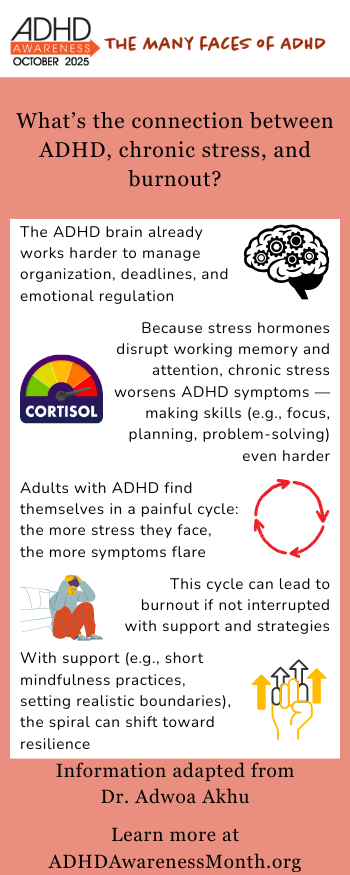ADHD and stress feed each other—symptoms make stress harder to manage, and chronic stress makes symptoms worse. Over time, this cycle can lead to burnout if not interrupted with support and strategies.
One client described it as “living with the volume turned up all the time.” The ADHD brain already works harder to manage organization, deadlines, and emotional regulation. Each missed detail or tense interaction can add another layer of stress. Over time, the nervous system feels under siege (Kooij et al., 2019).
Chronic stress then worsens ADHD symptoms. Stress hormones disrupt working memory and attention, which means the very skills someone needs most—focus, planning, problem-solving—become even harder (Selye, 1976).
That’s why many adults with ADHD find themselves in a painful cycle: the more stress they face, the more symptoms flare, and the closer they come to burnout (Shaw et al., 2014).
The good news is that the cycle can be interrupted. My client began using short mindfulness practices between tasks and setting realistic boundaries at work. Within weeks, she said, “I feel like I’m carrying less weight around.” Stress and ADHD are tightly connected, but with support, the spiral can shift toward resilience.
About the Author

Dr. Adwoa Akhu is a licensed psychologist, author, and trainer specializing in stress resilience, burnout prevention, and ADHD support. She blends science, compassion, and practical tools to help people thrive.
References
- Kooij, J. S., Bijlenga, D., Salerno, L., et al. (2019). Updated European Consensus Statement on diagnosis and treatment of adult ADHD. BMC Psychiatry, 19, 179. https://bmcpsychiatry.biomedcentral.com/articles/10.1186/s12888-019-2355-7
- Shaw, P., Stringaris, A., Nigg, J., & Leibenluft, E. (2014). Emotion dysregulation in attention-deficit/hyperactivity disorder. American Journal of Psychiatry, 171(3), 276–293. https://doi.org/10.1176/appi.ajp.2013.13070966
- Selye, H. (1976). Stress in health and disease. Butterworths.

